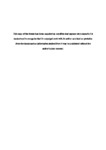An Interdisciplinary Assessment of the Mud Crab Scylla serrata as a Sustainable Livelihood Resource in Southwest India
| dc.contributor.supervisor | Turner, Lucy | |
| dc.contributor.author | Apine, Elina | |
| dc.contributor.other | School of Biological and Marine Sciences | en_US |
| dc.date.accessioned | 2022-05-13T12:30:14Z | |
| dc.date.issued | 2022 | |
| dc.identifier | 10574736 | en_US |
| dc.identifier.uri | http://hdl.handle.net/10026.1/19223 | |
| dc.description.abstract |
Fishing and aquaculture are important income-generating activities for coastal communities in India. However, the challenges of climate change and overexploitation have prompted the exploration of new, alternative, sustainable, target species that previously have received little attention. This thesis considers the potential of the mud crab Scylla serrata as a sustainable livelihood resource for local communities in southwest India where currently crab fishing and, particularly, farming is less common compared to southeast India. As fisheries and aquaculture are inherently complex social-ecological systems affected both by biological and socio-economic factors, this thesis has taken an interdisciplinary approach to identify the main barriers and drivers to small scale mud crab farming in southwest India, in particular, Karnataka. By applying social science approaches, this thesis revealed that the main barriers to mud crab aquaculture for fishers in Karnataka are poor access to land and lack of financial support. Whereas already established mud crab farmers in Andhra Pradesh on the southeast coast, reported a limited supply of crab seedlings and increased water temperatures causing mass mortality to be their main challenges. Biological studies confirmed the significant adverse effects of ocean warming on mud crabs. Increased water temperatures were linked to decreased microbial diversity of the mud crab gut microbiome, which can potentially affect crab health status. Meanwhile, the location (east or west coast) viii and habitat (wild sites or crab farms) did not affect the gut microbial composition. Exposing juvenile crabs to simulated climate change conditions indicated that not only warming, but freshening as a result of projected increased rainfall, causes an increase in oxygen consumption in crabs, potentially negatively affecting their physiological health. By analysing the overall findings with the help of systems thinking within a social-ecological systems framework, this study identified four key points of intervention, which could improve the sustainable use of this species as a livelihood resource - adaptation to climate change conditions, improved supply of crab seedlings and access to land for aquaculture purposes, and changes in local governance systems. | en_US |
| dc.language.iso | en | |
| dc.publisher | University of Plymouth | |
| dc.rights | Attribution-NonCommercial-NoDerivs 3.0 United States | * |
| dc.rights.uri | http://creativecommons.org/licenses/by-nc-nd/3.0/us/ | * |
| dc.subject | Sustainable Livelihoods | en_US |
| dc.subject | Gut Microbiome | en_US |
| dc.subject | Ecophysiology | en_US |
| dc.subject | Climate Change | en_US |
| dc.subject | Vulnerability | en_US |
| dc.subject | Sustainable Aquaculture | en_US |
| dc.subject.classification | PhD | en_US |
| dc.title | An Interdisciplinary Assessment of the Mud Crab Scylla serrata as a Sustainable Livelihood Resource in Southwest India | en_US |
| dc.type | Thesis | |
| plymouth.version | publishable | en_US |
| dc.identifier.doi | http://dx.doi.org/10.24382/797 | |
| dc.identifier.doi | http://dx.doi.org/10.24382/797 | |
| dc.rights.embargodate | 2023-05-13T12:30:14Z | |
| dc.rights.embargoperiod | 12 months | en_US |
| dc.type.qualification | Doctorate | en_US |
| rioxxterms.version | NA | |
| plymouth.orcid.id | https://orcid.org/ 0000-0001-5423-8792 | en_US |
Files in this item
This item appears in the following Collection(s)
-
01 Research Theses Main Collection
Research Theses Main



